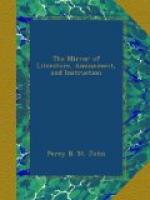Thus it came to pass (to revert to our text), that Cranmer was sent to college in his fourteenth year, Oxford and Cambridge being at that time the substitutes for the schools which have succeeded them, and being considered the two great national receptacles for all the boys in the country. There they were subjected to corporal punishment. The statutes were framed with a reference to the habits of mere boys; it is forbidden, for instance, in one of the Cambridge statutes, to play marbles on the senate-house steps; and the number of the students was so enormous (still for the same reason), that Latimer, in one of his sermons, speaks of a decrease in those of his own time, to the amount of no less than ten thousand.—Quarterly Review.
* * * * *
A TRUE STORY OF MAGIC IN THE EAST.
M. ——, a Perote, one who knew “the difference between alum and barley-sugar,"[3] if ever man did, a good catholic, a conscientious person, a dragoman, and as such necessarily attached to truth, and never telling a lie, save in the way of business, was himself the hero, or the witness rather of the story he narrated. He was sent one morning from the European palace of ——, at Pera, on business in Constantinople. He was in a great hurry, but as he reached the Meytiskellesi, or wharf of the dead, and was about stepping into his caeik to be rowed across the harbour of the Golden Horn, either a nail in one of the rough planks of the wooden quay caught his slipper, or a post on it his robe, I forget which—but the dragoman turned round, and saw standing close by him, a tall and very notorious African magician, who had long been practising at the capital, and was known to every body as one of the lions of the place. To do a civil thing, and perhaps to keep well in this world with one who had intercourse with the spirits of the next, the dragoman naturally supposing he was waiting there on the water’s edge only to cross over from the suburb to the city, very politely invited him to take a passage in his caeik. The tall African made no verbal reply, but smiled, and waved his hand to decline the high honour.
[3] A Turkish saying, much in use.
The dragoman then concluding, that instead of waiting to cross over himself, he was expecting the arrival of some one from the opposite side of the Golden Horn, stepped into his caeik, which instantly glided from the quay and shot across the port. The boats at Constantinople are all very light and sharp, and go with astonishing speed, even when propelled with one pairs of oars; but people of high consideration, like dragomans, generally have two pairs to their caeiks, and at this time M. —— being in a very great hurry, told his two rowers to pull as fast as they could.
When about half way on his short aquatic journey, M. —— turned his head and looked back, and then he saw at the end of the quay, just where he had left him, the tall African standing starch and motionless, like a granite statue before an Egyptian temple.




